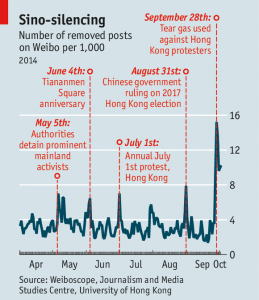The Economist, October 3, 2014– Streets in Hong Kong have been filled with protesters calling for democratic reform and tweeting their experiences furiously. But in mainland China, people are struggling to discuss the unrest online. Censors have been poring over Weibo, China’s closely controlled version of Twitter, to scrub out even oblique references to it.
The chart above shows the number of deleted posts every day since April among a sample of between 50,000 and 60,000 users in mainland China. On September 28th, the most tumultuous day of the protests, deletions hit a record: 15 of every 1,000 posts, more than five times normal levels. Mentions of “Hong Kong police” and any posts with a #HongKong hashtag fell afoul of the censors. The data were compiled by Weiboscope, a censorship-monitoring programme at the University of Hong Kong. FreeWeibo, a website developed by GreatFire.org, another Chinese censorship watchdog, captured many of the deleted posts. Most were written by ordinary users: people with a few thousand followers whose non-censored messages revealed otherwise unexceptional lives, of dinners with family and frustrations with traffic jams.
Many clearly crossed the line of tolerated discussion in China. “Whoever obstructs Hong Kong’s decision will be branded a villain of history,” read one deleted post. Some were subtler: “Hong Kong’s streets are really clean,” read one post attached to a photo of protesters lying on the ground to sleep. It was reposted 12 times before being deleted. Others managed to get around the censors by being even more indirect, such as by posting old photos of Xi Jinping, China’s leader, carrying an umbrella (a nod to Hong Kong’s “umbrella revolution”).
The lid was lifted a little on September 29th when an article in the People’s Daily labelled the Hong Kong protesters as “extremists”. Bloggers then had licence to repost the article and publish their views on it. But these too were censored. The vast majority of comments that were allowed to remain online were critical of the protests. One post by Ren Chengwei, a television actor with more than 200,000 followers on Weibo, was typical: “Hong Kong compatriots, don’t make such a fuss. You’re going too far.”


 Follow
Follow